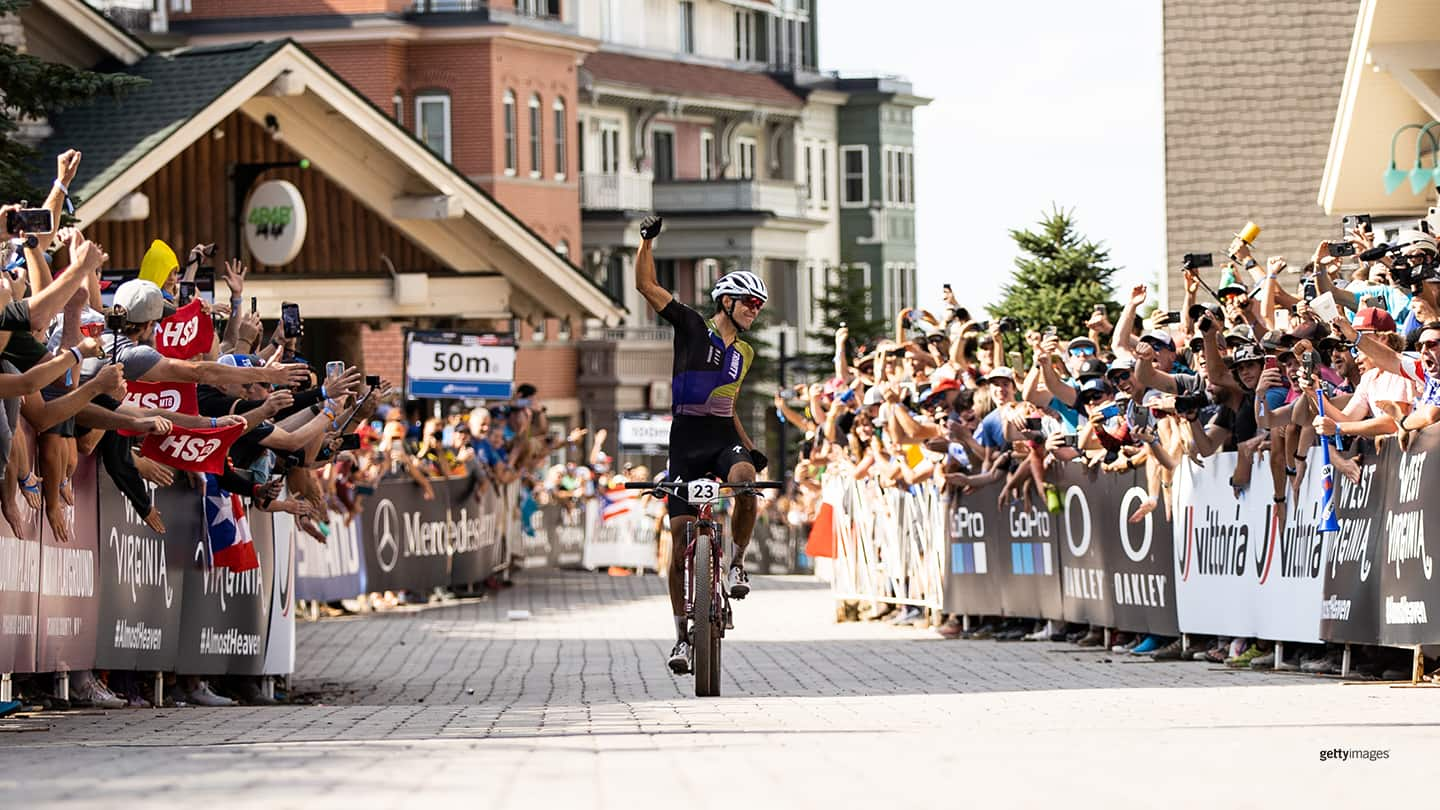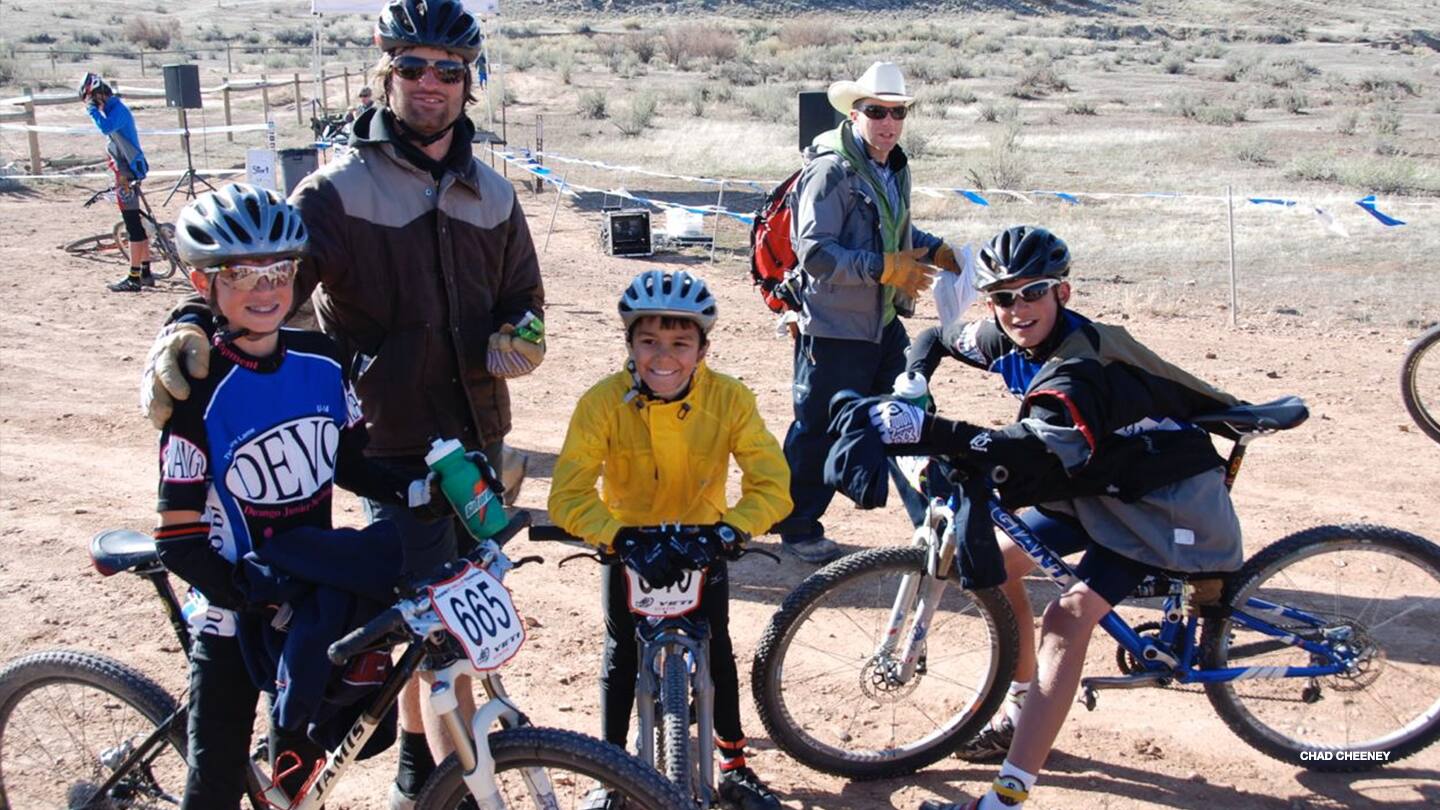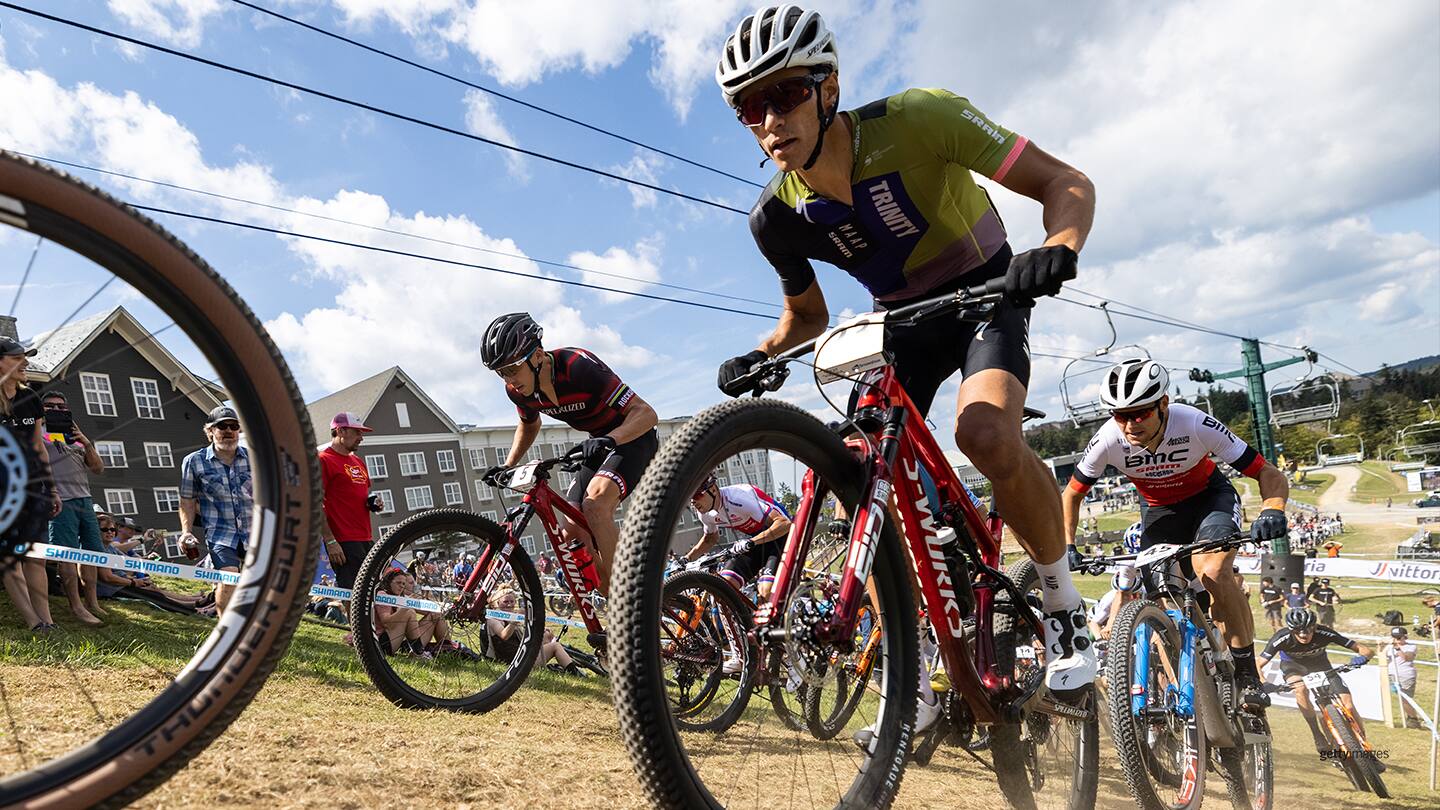
What Helped Christopher Blevins Win The First Mountain Bike World Cup For U.S. Men Since 1994
by Peggy Shinn

Christopher Blevins celebrates as he crosses the finish line during the men's elite cross-country Olympic distance race at the UCI Mountain Bike World Cup on Sept. 19, 2021 in Snowshoe, West Virginia.
Christopher Blevins has had quite a year.
The 23-year-old mountain biker competed in his first Olympic Games in Tokyo. Then, he claimed the world short-track title his first year in the senior ranks. He ended his season winning the final 2021 UCI MTB World Cup cross-country race. It was the first time an American man had won a mountain biking world cup in 27 years.
It was, said Blevins, “the best surprise of my life.”
“A win like this just affirms how much work my team and I have put in,” said Blevins by phone from his home in San Luis Obispo, California. “There’s a sense of I did this, and we can do this many more times.”
Oh, and in June, he graduated from Cal Poly with a degree in business administration and a focus on entrepreneurship. Blevins is one of few professional cyclists in the men’s ranks to hold a college degree. He is also likely the only one who excels in spoken poetry.
Blevins’s year is not over yet. Talented in cycling no matter the discipline — including BMX and road racing — Blevins plans to race the cyclocross season this fall, with the goal of qualifying for the world cup. His team, Trinity Racing, allows him to compete in several disciplines, including gravel races.
One of the brightest mountain biking talents since the 1990s, Blevins’s ultimate goal is to win a medal at the Olympic Games Paris 2024.
So what led to Blevins’s remarkable season? And why has it taken 27 years for the U.S. men to re-emerge atop the ranks in a sport invented in the United States?
Men’s Mountain Biking in the 1990s
The first UCI MTB World Championships and World Cup season were held in 1990, and Ned Overend — from Durango, Colorado — became the first world champion and overall world cup winner in cross-country racing. A year later, John Tomac claimed both titles.
For the next three years, Overend, Tomac, and Tinker Juarez stood on both the world championship and overall world cup podiums. It seemed natural that a sport born on California’s Mt. Tamalpais would be ruled by American riders.
But 1994 was the last year a U.S. man won a world cup race or a world championship medal. For the past 27 years, European mountain bikers have ruled the sport.
Chad Cheeney — who started Durango’s DEVO cycling program for young kids (alumni include Blevins, Tour de France star Sepp Kuss and 2016 Olympian Howard Grotts, among many others) — has a theory, as does Blevins.
First, most of the world cups moved to Europe in the mid-1990s, making it more expensive for Americans to compete. And mountain biking drew top European road racers to its ranks.
“These Europeans with super cycling backgrounds were committed to it because there was more money in it,” explained Cheeney.
The development pipeline in the U.S. was also lacking. Mountain biking was seen as an alternative sport, with few youth-based programs to attract new talent. Rather than coming up through fun local teams, U.S. mountain bikers mostly trained alone.
“Back in the day, you showed the fun side of the sport to non-racers and then to the race kid, you taught them how Lance Armstrong trained,” said Cheeney.
In the mid-2000s, programs like Durango’s DEVO and the National Interscholastic Cycling Association (NICA) were founded. Kids could join these development programs with their friends, learn to mountain bike, but mostly have fun. Getting fit was just a side benefit.
“We sold it as fun,” said Cheeney.
Blevins, who was raised in Duranog, points out that DEVO’s goal is to develop life-long cyclists. The program’s motto is NFTF — “never forget the feeling.” It’s a saying that Blevins thinks about often, even now.
“That philosophy of fun, adventure, and community just accidentally translated to making extremely fast cyclists,” he added.

Christopher Blevins (middle) poses for a picture with teammates and former coach Chad Cheeney.
Blevins’s Background
It also helped that Blevins got to train with talents like Kuss and Grotts, who are a few years older. And similar to the 1990s legends Tomac and Juarez, Blevins raced BMX bikes before he focused on mountain biking. His dad put him on a BMX bike at age 5 — because he was too little to clip into mountain bike pedals. He raced BMX until age 16, racking up eight national titles.
When Blevins was in elementary school, his parents asked Cheeney if he would mountain bike with their son. The Durango DEVO program is for middle- and high school-aged kids, and Blevins was too young.
“He was just a little guy, but he could shred,” said Cheeney. “He was the third or fourth grader who could hang with the middle school and even the high schoolers.”
Watching Blevins ride, people in Durango would say, “This kid is going to be a star.”
By age 12, Blevins was competing in both road and mountain bike races, winning mountain bike nationals in his age group from 13-19 years old and a road national title when he was 16. Two years later, in May 2016, he won the Course de la Paix, a major junior stage race in the Czech Republic where up-and-coming stars first make their mark.
Shortly thereafter, Blevins graduated from Durango High School and gave a graduation speech. Among other advice, he told his classmates: “If you find yourself outgrowing your dreams, I hope it's only because you're discovering new ones.”
Balancing College and Pro Racing
From high school, Blevins headed to Cal Poly, his dad’s alma mater in San Luis Obispo. His dad, Field, is an orthopedic surgeon in Durango.
Blevins chose Cal Poly for several reasons, among them the temperate climate (ideal for year-round training) and the university’s quarter system, which allowed him to take off spring quarters to race internationally.
“It was super important to me and my family to pursue education alongside my cycling goals,” Blevins said.
He knew he would have to make sacrifices — like skipping campus parties and missing out on typical extracurricular activities. Nor could he travel to as many training camps and races as he wanted. But it was a good learning experience, like “how to navigate multiple things at once and really simplify and focus on what matters to me,” he said.
In 2018, when he was 20 years old, Blevins won a stage in the Tour de Gila road cycling stage race, a silver medal at mountain bike world championships, and the U23 national cyclocross title — three big wins in three different cycling disciplines. His eyes were on the Olympic Games Tokyo 2020 (he had written Tokyo 2020 on a sticky note in 2016 and put it on his bedroom wall). He needed to focus on one cycling discipline, and cyclocross is not (yet) and Olympic sport.
He picked mountain biking — because growing up in Durango, “mountain biking is cycling,” he said. He also picked the fat-tire sport because of “the amount of fun I have on a bike and mountain biking is the best way for that to come out,” he said, with a sense of joy in his voice.
Tokyo Olympic Games
Blevins traveled to the 2020 Olympic Games in Tokyo as the sole U.S. men’s mountain biker. His goal as a first-time Olympian was to finish in the top 15.
He battled through a chaotic start loop on the Olympic course, then steadily moved up through the field, finishing 14th — the second best finish for an American male mountain biker at the Olympic Games behind Todd Wells’s tenth place at the 2012 London Games.
“I was aiming for top 15 and I ended up 14th,” Blevins said. “But the larger goal was to gain experience and motivation for Paris when I can be in the hunt for a medal.”
World Championships
A month after the Tokyo Olympic Games, Blevins competed in the 2021 world championships in Italy. A two-time U23 worlds silver medalist (2018 and 2020), Blevins was competing for the first time in the elite ranks. He did not have great expectations in cross-country. But short track was another story.
“I grew up racing short-track,” he said.
His BMX background serves him well in the discipline, in which racers compete for 20 to 30 minutes on a short loop, versus cross-country races that are three to four times longer and are often held on hilly courses.
“The punchiness you get from BMX, you know, a decade of sprinting 30 seconds, gave me the finishing power I needed,” he said.
In the inaugural world championship short track race, Blevins sprinted for the win — earning his first world championship title and the rainbow jersey given to all cycling world champions.
“Seeing myself in the rainbow jersey was a total trip,” he said.
Blevins also earned a silver medal in the team cross-country event and bronze in the e-MTB race.

Christopher Blevins competes during the men's elite cross-country Olympic distance at the UCI Mountain Bike World Cup on Sept. 19, 2021 in Snowshoe, West Virginia.
The “Grand Experiment”
A week after world championships, Blevins entered the Tour of Britain, an 8-day road cycling stage race. It was, he said, a grand experiment. He knew coming off the Olympic Games would be an emotional letdown.
“Doing intervals by yourself [after an experience like the Olympic Games] feels like eating broccoli after having dessert,” he said.
But entering a race would be different, especially a road race against big guns like world champions Wout van Aert and Julian Alaphilippe. It was the biggest road race of Blevins’s life. He finished 58th overall. But that was not the point.
“I had some good moments,” Blevins said, including finishing 24th in stage six. “And I really adapted to road racing throughout the week.”
The biggest advantage: the fitness he gained from eight consecutive days of hard racing.
World Cup Win & Beyond
From the UK, Blevins flew to Snowshoe, West Virginia, for the final UCI MTB World Cup of the 2021 season. For the first time in two years, his parents and sister would get to see him race, along with scores of U.S. fans.
Blevins rode the cross-country race with the lead group, and on the last lap, attacked in a tight corner, dropping Swiss legend Nino Schurter — the 2016 Olympic champion who three weeks earlier had won his ninth world championship title — and Romanian Vlad Dascalu, who had won the 2019 U23 world cross-country title.
The American solo-ed to victory.
“It like an unbelievable dream to come down that last straightaway and see all the fans and high-five them, then cross the line and hug my family,” Blevins said. “To win a world cup is huge, but to do it in the States was even more special.”
Cheeney was coaching at a collegiate race when he saw on Twitter that Blevins had won his first world cup. He ran around hugging people.
“I didn’t expect it to come so early [in his career], but all of us knew it was going to happen, just maybe two or three years down the road,” said Cheeney.
After a couple weeks at home in San Luis Obispo, Blevins will jump into cyclocross racing. He plans to soon launch a creative-platform-slash-business called Stillspoke with friends from Durango and DEVO, Keenan DesPlanques, Domi Frideger, and Henry Nadell. The platform will “be based around storytelling and videos and other creative endeavors,” explained Blevins.
As for the coming seasons, Blevins sees his calendar as a blank canvas. He and his Trinity Racing team will put together races that support his bigger goals.
“Whether it’s road stage races, gravel racing, cyclocross, adventure mountain bike races, they’re all on the table,” he said. “It’s all around really building toward the big goal, which is Paris in three years.”